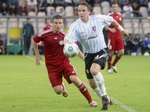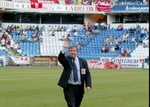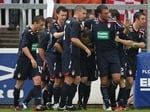In the midst of the gloom there is a radiance that etches slivers of hope onto the hearts of all League of Ireland fans. The results from this week's Irish involvement in the Champions League and the Europa League have been very satisfying indeed.
Even though I am a genuinely optimistic individual by nature, I must admit I approached this European week with a certain element of trepidation in the light of the economic pressure that had elbowed its way into the preparations of the three Irish clubs who representated us on Wednesday and Thursday.
At a time when confidence is as low as a dark and heavy mid-winter cloud, the performances of the League of Ireland clubs have pushed the bleakness back appreciably and facilitated the emergence of a sunnier disposition.
 God knows there is enough pressure on clubs entering the lion's den of Europe without the managers and players being made aware that the immediate future of their clubs could be dependent on their ability to gain positive results this time out.
God knows there is enough pressure on clubs entering the lion's den of Europe without the managers and players being made aware that the immediate future of their clubs could be dependent on their ability to gain positive results this time out.
In the not too distant past, European participation for our clubs was something that occurred briefly, and all too often embarrassingly, during the pre-season period. It was little more than a peripheral occurance that over the years even drew comment from some well known managers questioning Irish clubs' involvement in this annual debacle.
The truth was that the ability was always there, it was just the know-how that was lacking. But the know-how needed assistance. It required an alteration in the mentality of part-time football that had restricted the imagination of everyone involved.
For myself, it was Europe involvement more than anything else that made me realise the importance of the move to summer soccer.
In my first month as manager of Shelbourne in the mid-90s we played Akranes of Iceland in the UEFA Cup. We drew at Tolka Park in the first leg but lost the second quite badly.
During the second half of the second leg the discipline of some of the players left a lot to be desired. Once the tie was lost early into the second period of the game in Iceland I realised that many of the players held very little respect for European involvement as petulance decended. I was quite honestly shocked by this realisation.
The following year we played Kilmarnock in the same competition. By then there had been many changes in the personnel and attitude of the team. We lost the first leg in Scotland 2-1 having led for a huge part of the game and with the home team scoring two late and very contentious goals.
Contentious goals and incidents are part and parcel of the away involvement in European competition and especially so in the qualifying stages and one can only accept this and get on with it.
The return game in Tolka Park finished 1-1 and in truth could have gone either way. The point was, we lost to a full-time outfit that at that particular time was by far the best in Scotland outside of the Rangers and Celtic monopoly.
 I came to the conclusion that had we had an extra level of fitness we could have beaten Kilmarnock and in an official discussion with Chairman Finbar Flood and CEO Ollie Byrne some time later I explained my thoughts on the potential of the club going full-time.
I came to the conclusion that had we had an extra level of fitness we could have beaten Kilmarnock and in an official discussion with Chairman Finbar Flood and CEO Ollie Byrne some time later I explained my thoughts on the potential of the club going full-time.
While both agreed fully with the essence of my proposal, Finbar was of the definite opinion that it would require more stages of development, while Ollie I do believe, had already formed a desire to make Shelbourne a full-time outfit.
The three of us realised the opportunity that a well-run League of Ireland club could have in a future combining summer soccer and full-time footballers.
In recent years, the success of both of these aspects of Irish professional football has transformed our involvement in Europe.
Ollie’s grand dream of gaining entry to the elite level was however, never realised and unfortunately I believe it became a personal crusade that regretably entered the realms of compulsion.
It is a very thin line that holds apart the sweet rewards of success and the frustration that accompanies even the most passionate but unsuccessful attempts to achieve them.
In a season that holds many daunting challenges for League of Ireland clubs, the last thing that was needed was a disappointing week of European involvement.
Thankfully, the clubs concerned demonstrated the increasing potency of LoI clubs in international competition. On the back of their inexperience and their significant injury list, Sligo Rovers could be excused their early exit, but the consequence of this was that it placed even more pressure on the three remaining teams.
 St Pat's showed on Thursday that they have enough about them to go to Malta and win the second leg, and while both Bohemians and Derry City have managed to wrestle control of their own destinies, they will accept totally the need to be very professional and clinical in the decisive return legs.
St Pat's showed on Thursday that they have enough about them to go to Malta and win the second leg, and while both Bohemians and Derry City have managed to wrestle control of their own destinies, they will accept totally the need to be very professional and clinical in the decisive return legs.
The menacing elements of economic darkness that have attached themselves to this 2009 season have been lightened temporarily by the encouraging performances of this week. In spite of this, it is imperative that the three teams concerned must remain unafraid of the consequences of failure and exude the courage to perform with confidence and belief.

!['The performances of the League of Ireland clubs [in Europe] have pushed the bleakness back appreciably and facilitated the emergence of a sunnier disposition.'](https://www.rte.ie/images/00016c6a-800.jpg)